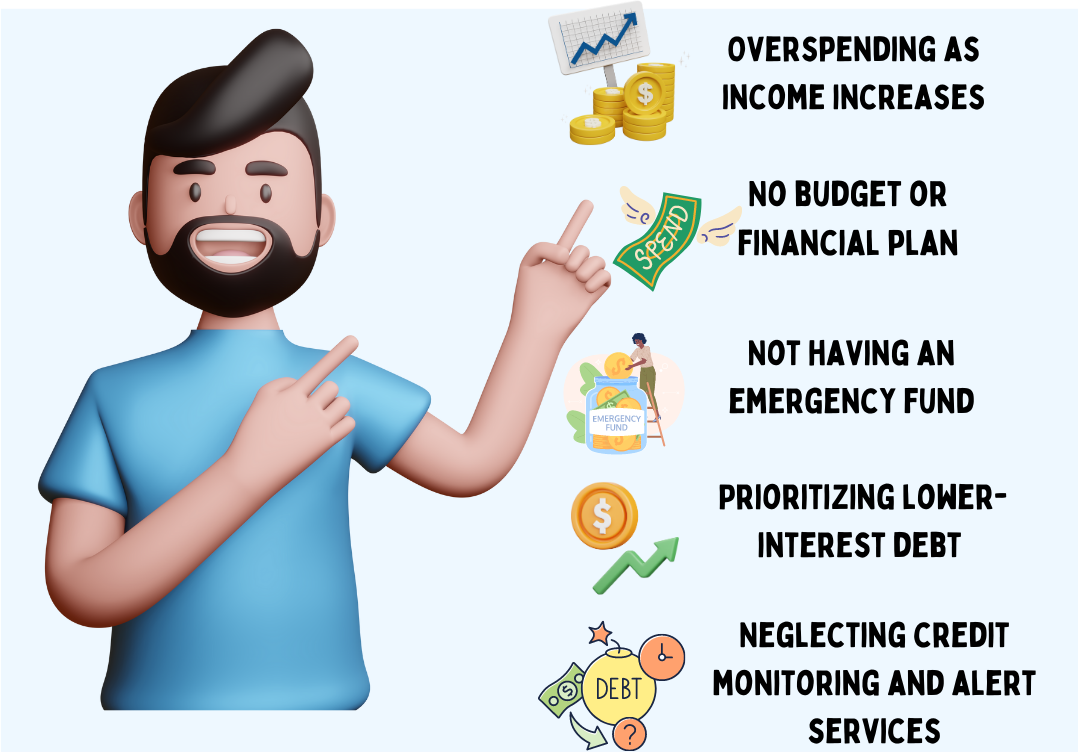Top 5 Money Mistakes That Will Cost You a Fortune

In a world of instant gratification, it’s easy to fall into common financial pitfalls that can have lasting impacts. The result of these money mistakes might not be immediately apparent, but over time, they can cost you a fortune. From mindless overspending to neglecting crucial financial safeguards, it’s time to recognize and rectify these missteps. Let’s get to it.
Excerpt:
● Overspending as income increases
● No budget or financial plan
● Not having an emergency fund
● Consistently prioritizing lower-interest debt over higher-interest debt
● Neglecting credit monitoring and alert services
Money Mistakes #1. Overspending as income increases
Overspending happens when people spend more than they can afford, often due to modern
conveniences like online shopping. This can lead to debt, poor credit, and hindered savings.
Causes include emotional spending and peer pressure.
To curb overspending:
● Delay purchases
● Unsubscribe from tempting offers
● Budgeting, separating expenses and savings, and practicing patience can help
regain financial control.
Money Mistakes #2. No budget or financial Plan
Now that you know that overspending is a big money mistake, you might ask – what’s the solution? To budget! A budget is like a plan for your money. It tells you what you can spend and helps you save for important things. Even if you don’t earn a lot, a budget is super important. And if you’re saving up for something cool, a budget keeps you on track. So,
having a budget is like having a money superpower!
To budget:
● Track income and expenses
● Categorize spending
● Differentiate needs and wants
● Set spending limits
● Regularly review and adjust
● Stay disciplined for financial goals
Money Mistakes #3. Not having an emergency fund
Picture this: your car breaks down in a downpour, or your pet needs urgent care. Not having
an emergency fund is a financial no-no. An emergency fund is like a safety net – money you
save for unexpected situations. Without it, you might scramble for cash or get into debt. An
emergency fund is like your money superhero, ready to rescue you from financial surprises
and keep you cool under pressure.
To have an emergency fund:
● Start by setting a savings goal
● Save consistently, even a small amount helps
● Aim for 3-6 months’ worth of expenses
● Keep the fund separate from regular savings
● Only use it for true emergencies
● Replenish after using it
● Enjoy peace of mind and financial security
Money Mistakes #4. Prioritizing lower-interest debt over higher-interest debt:
Another wrong financial practice would be consistently prioritising lower-interest debt over
higher-interest debt when deciding which debts to pay off first. This approach could result in paying more interest overall and potentially prolonging your debt repayment journey. It’s
generally better to focus on paying off higher-interest debts first to minimize interest costs.
To NOT prioritise lower-interest debt over higher-interest debt:
● List debts with rates and payments
● Budget using 50/30/20 rule
● Use avalanche method (high interest first)
● Or try snowball method (smallest debt first)
● Having a plan speeds up debt-free journey
Money Mistakes #5. Neglecting credit monitoring and alert services
Last but definitely not the least, neglecting credit monitoring is a financial blunder. Alert
services help watch over your credit report, spotting any unusual stuff. If you don’t keep an eye on your credit, problems like identity theft or errors might go unnoticed. These issues
could harm your credit score and make borrowing money harder or more expensive.
To track credits:
● Detects identity theft
● Early error identification
● Maintains good credit score
● Prevents costly mistakes
So, there you have it – five money mistakes that could end up costing you a fortune. Fear
not! With a little budgeting, some emergency fund superhero action, and a smart approach
to debt, you can steer clear of these financial troubles. So, go ahead, take charge of your
finances, and watch your money grow. Stay wise, stay wealthy!









